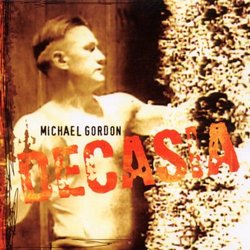| All Artists: Michael Gordon, Kasper De Roo, Basel Sinfonietta Title: Michael Gordon: Decasia Members Wishing: 1 Total Copies: 0 Label: Cantaloupe Release Date: 8/13/2002 Album Type: Import Genre: Classical Style: Symphonies Number of Discs: 1 SwapaCD Credits: 1 UPC: 713746272029 |
Search - Michael Gordon, Kasper De Roo, Basel Sinfonietta :: Michael Gordon: Decasia
 | Michael Gordon, Kasper De Roo, Basel Sinfonietta Michael Gordon: Decasia Genre: Classical |
Larger Image |
CD Details |
CD ReviewsA Symphony in Decay Jerry Bowles | New York, New York United States | 09/03/2002 (5 out of 5 stars) "Michael Gordon's Decasia is a huge single movement work that simply, but relentlessly, explores the idea of decay. As usual, Gordon's spare musical vocabulary combines elements of rock, ambient, minimalism and sheer noise to create a mosaic of sound that is in your face and gone before you realize what has happened. Sort of like life. Similar in atmospheric ambiance to his string orchestra piece WEATHER (Nonesuch)-- Gordon uses an amplified and retuned orchestra to create what seems to be the impression of a piano that has crashed to the ground from a great height, with gripping strings, four detuned pianos, and massive winds and brass. Gordon's Decasia lies at the heart of Bill Morrison's film of the same name--an 80-minute work created from restored nitrate footage re-photographed onto 35mm, which uses decaying found footage from the early days of film to investigate the human desire to transcend the limitations of earthbound existence. The abstract scenario follows the course of a life-cycle, beginning with 1927 footage by Sergei Eisenstein of a cesarean section and live birth, and includes shots from a mission school where Native Americans were taught discipline by nuns in foreboding black shawls. At the 2001 premiere performance, the Basel Sinfonietta stood on a triangular pyramid 3 tiers high, completely surrounding the audience within. Produced jointly by Ridge Theater and Basel Sinfonietta, Morrison's film of black and white archival footage in various states of deterioration was projected onto material draping the structure. The sound is Mahlerish without the melodrama, minimal without being boring, and huge - stratospheric harmonies clanging into one into another, large blocks of sounds shifting and falling - like a cross-fire hurricane, perhaps, but definitely something that is not going quietly into that good night. Decay may be an quiet internal process to some but here it is a loud, grunge-meets-garage public event. Gordon's music may lack the easy elegance of his Bang on a Can partner David Lang or the studied sophistication of his wife and fellow Banger Julia Wolfe, but it more than compensates for these absences through sheer, visceral power. This is uncompromising music for those who like it loud and with a back beat you can't lose." Totalism - Minimal Meets Xenakis Christopher Forbes | Brooklyn,, NY | 12/30/2002 (4 out of 5 stars) "This CD is my first introduction to the music of Michael Gordon, one of the founding triumverate of New York's Bang on a Can. Judging by this release I've missed something quite special. Decasia was commissioned by the Basel Sinfonietta in Switerland, who premiered it as a multimedia event in 2001. Devoid of the visual content here, the music still impresses with it's originality and sheer sonic impact. The music combines the repetative structures of minimalism (albiet, not evenly repetative. There is an unpredictable quality about the repeated structures that is fascinating.) with the formalized chaos of Xenakis. The orchestra is electronically amplified and detuned, along with four detuned pianos. If at times, the work can veer a little too much in the direction of John Adams (section 4 sounds like it could be lifted from Harmonieleher) most of it remains distinctly original. The sense of steady pulse and rhythmic vitality make the work more accessible than much European avant-garde work, but the melodic and harmonic language of the work is decidedly more complex and challenging than anything written by the second or third generation minimlists like Nyman or Bryars. This is a work that deserves a hearing." Smart Cool Big New Daniel Johnson | 08/22/2002 (5 out of 5 stars) "This piece is only my second acquaintance with Gordon's music, after the title track on Bang on a Can's excellent album, Industry--another tune about dissolution, I suppose, and one of the best tracks on that disc. To describe the musical language of Decasia, I might ask you to imagine Penderecki's noisiest stuff--or Stockhausen's Helicopter string quartet--crossed with a hardcore instrumental groove from an unpretentious rock band, by way of the late minimalists. It's pretty unrelenting for the whole 67-minute length, but the climax is tremendous, well worth the investment of time and energy. I was struck, listening to the piece for the first time, by the feeling that I was hearing something completely new and, somehow, very important."
|
